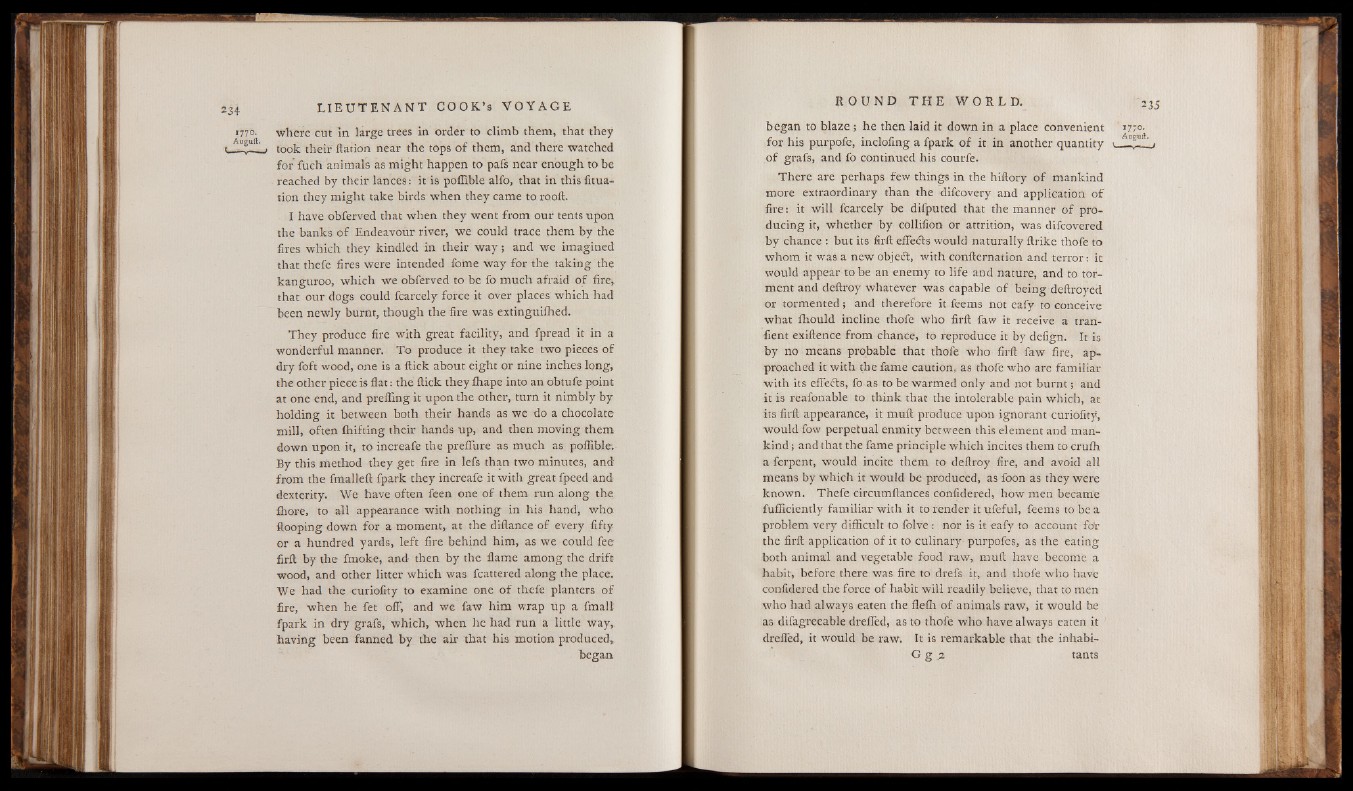
2 3 4 L I E U T E N A N T C O O K ’ s V O Y A G E
1770- where cut in large trees in order to climb them, that they
. took their Ration near the tops of them, and there watched
for fuch animals as might happen to pafs near enough to be
reached by their lances: it is poffible alfo, that in this fitua-
tion they might take birds when they came to rooft.
I have obferved that when they went from our tents upon
the banks of Endeavour river, we could trace them by the
fires which they kindled in their w a y ; and we imagined
that thefe fires were intended fome way for the taking the
kanguroo, which we obferved to be fo much afraid of fire,
that our dogs could fcarcely force it over places which had
been newly burnt, though the fire was extinguifhed.
They produce fire with great facility, and fpread it in a
wonderful manner. To produce it they take two pieces of
dry foft wood, one is a flick about eight or nine inches long,
the other piece is flat: the flick they fhape into an obtufe point
at one end, and prefling it upon the other, turn it nimbly by
holding it between both their hands as we do a chocolate
mill, often fhifting their hands up, and then moving them
down upon it, to increafe the preffure as much as poffible.
By this method they get fire in lefs than two minutes, and
from the fmalleft fpark they increafe it with great fpeed and
dexterity. We have often feen one of them run along the
Chore, to all appearance with nothing in his hand1, who
ftooping down for a moment, at the diftance of every fifty
or a hundred yards, left fire behind him, as we could fee
firft by the fmoke, and then by the flame among the drift
wood, and other litter which was fcattered along the place.
We had the curiofity to examine one of thefe planters of
fire, when he fet off, and we faw him wrap up a fmall
fpark in dry grafts, which, when he had run a little way,
having been fanned by the air that his motion produced,.
began
began to blaze ; he then laid it down in a place convenient
for his purpofe, inclofing a fpark of it in another quantity
of grafs, and fo continued his courfe.
There are perhaps few things in the hiftory of mankind
more extraordinary than the difcovery and application of
fire; it will fcarcely be difputed that the manner of producing
it, whether by collifion or attrition, was difcovered
by chance : but its firft effects would naturally ftrike thofe to
whom it was a new object, with confternation and terror • it
would appear to be an enemy to life and nature, and to torment
and deftroy whatever was capable of being deftroyed
or tormented; and therefore it feems not eafy to conceive
what fhould incline thofe who firft faw it receive a tran-
fient exiftence from chance, to reproduce it by defign. It is
by no means probable that thofe who firft faw fire, approached
it with the fame caution, as thofe who are familiar
with its effeftts, fo as to be warmed only and not burnt; and
it is reafonable to think that the intolerable pain which, at
its firft appearance, it muft produce upon ignorant curiofity,
would fow perpetual enmity between this element and mankind
; and that the fame principle which incites them to crufh
a ferpent, would incite them to deftroy fire, and avoid all
means by which it would be produced, as foon as they were
known. Thefe circumftances confidered, how men became
fufficiently familiar with it to render it ufeful, feems to be a
problem very difficult to folve : nor is it eafy to account fofr
the firft application of it to culinary purpofes, as the eating
both animal and vegetable food raw, muft have become a
habit, before there was fire to drefs it, and thofe who have
confidered the force of habit will readily believe, that to men
who had always eaten the flefh of animals raw, it would be
as difagreeable drefled, as to thofe who have always eaten it
drefled, it would be raw. It is remarkable that the inhabi-
G g 2 tants